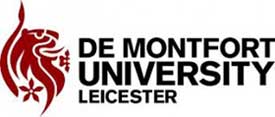Design courses
De Montfort University

- UK
- World Rank : 601
- Visit Website
The need for sustainable approaches to building design is recognised across the globe. As the effects of climate change are increasingly felt, the drive towards more energy efficient buildings is intensifying. Sustainable buildings need not be technologically complex, but a high level of sophistication in design procedures and performance analysis is required.
Accredited by both the Chartered Institution of Building Services Engineers (CIBSE) and the Energy Institute, this programme will allow you to develop an understanding of building physics and acquire skills in building simulation, with an emphasis on sustainability. This course is the opportunity for you to graduate with a recognised qualification, satisfying the educational aspects of becoming a chartered engineer.
This course is designed for those who wish to understand the ways new and renewable energy can be harnessed in buildings, gain the ability to undertake the simulation and modelling tasks essential for credible building performance analysis, and work creatively within a multi-disciplinary design team, including building services engineers.
You will develop a broad insight into energy and sustainability issues, building physics and performance, energy analysis techniques and in-depth knowledge of computer modelling techniques for the design of modern sustainable buildings.
Key features
You should have the equivalent of a British Honours degree (2:2 minimum) in a relevant numerate subject, for example engineering, physical sciences, mathematics. Architects with an interest in computer modelling are also encouraged to apply.
We are happy to consider equivalent qualifications from anywhere in the world.
If English is not your first language an IELTS score of 6 or equivalent when you start the course is essential. English Language tuition, delivered by our British Council accredited Centre for English Language Learning, is available both before and throughout the course if you need it.
If you have no formal academic qualifications but do have extensive industry experience we will consider your application on an individual basis.
| Type of Institution | Public |
| Campus Setting | Urban |
| Endowment | £1.17 million |
| Number of Campuses | 4 faculties |
| Number/Percentage of International Students | 23205 |
| Total number of Professors | 3240 |
| Student Satisfaction Rate | 86% |
| Graduate Job Rate | 97.3% |
| Number of Residence Vacancy | Around 3000 |
| International fee | Undergraduates- £13240 (annual) Postgraduates- £15950 (annual) |
| Number of Academic Programs | UG, PG, Part time, distance, blended |
| Mode of Program | Full time, distance and online |
| Average Graduate Salary | 19800 pounds a year |
| Field of Study | Avg.Fees |
|---|---|
| Art, Design and Humanities: | £13,750 |
| Business and Law | £13,750-£14,550 |
| Media | £13,750 - £14,250 |
| Engineering | £14,250 |
| Computing | £14,250 |
| Health and Life Sciences | £13,250 - £14,250 |
| Nursing BSc | £14,950 |
| Expenses | Estimated cost in pounds |
|---|---|
| Undergraduate tuition fee | 13,250- 14950 |
| Postgraduate tuition fee | 13600-15,900 |
| On campus accommodation | 5,000-6040 |
| Average cost of living | 97-110 per week |
DMU International Scholarship up to 1500 pounds
| Tuition Fees in UK (1st Year Average) | MS: £17276 | MBA: £17276 | BE/Btech: £16632 | BBA: £15130 | BSc: £16632 | MFin: £19000 | MA: £15560 | MIM: £18241 | MEM: £16950 | MArch: £14271 | BHM: £12662 | MIS: £15344 | MEng: £12876 | MBBS: £28865| MPharm: £15452 |
| Average Accomodation & Food Costs in UK | £850 to £1,050 a month |
| Entrance Exams in UK | TOEFL: 88 | IELTS: 6.5 | PTE: 59 | GMAT: 590 |
| Work and Study in UK | Permitted for 20 hours/week with a valid study permit. |
| Post Study Work Permit in UK | 2 Year after graduation depending on the course. |
| Cost of Student Visa in UK | £348 |
| Student Visa in UK | Your nationality, duration of your stay and purpose of your stay are the three essential factors for UK visa. For Non-EU students UK visa is mandatory. |
| Intakes in UK | There are mainly two intakes in UK: January/February & September/October. |
| Top Job Sectors in UK | IT Engineering, Product Design, Mobile Development, Designers, Logistics, etc. |
| Economy in UK | Growth Rate: 1.3% (2018) 1.4% (2019) 1.4% (2020e), 6th Largest Economy in the World by Nominal |
Tuition & fees :
£ 15,100
Hostel & Meals :
£ 6,384
Total
£ 21,484